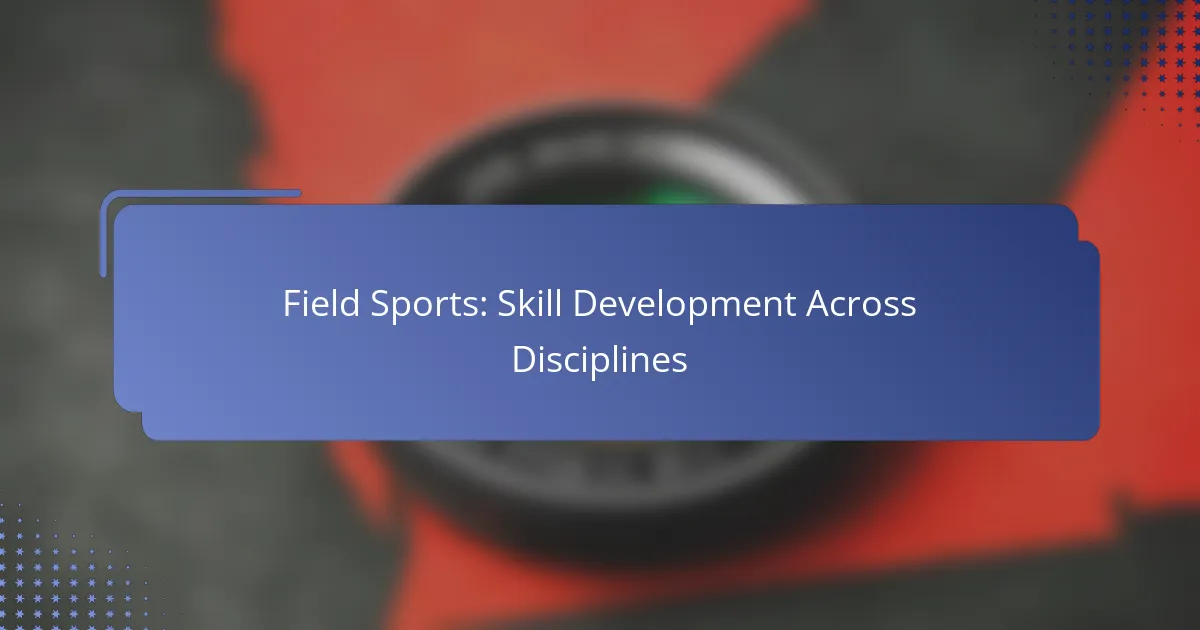Field sports require a multifaceted approach to skill development, combining structured training, regular assessments, and the use of technology to enhance athlete performance. By focusing on physical conditioning, mental toughness, and sport-specific skills, athletes can build the strength and resilience necessary for success. Additionally, teamwork plays a crucial role, fostering collaboration and communication that ultimately improves both individual and team performance.

What are the best practices for skill development in field sports?
Effective skill development in field sports involves structured training, regular assessments, and the incorporation of technology. These practices ensure athletes enhance their abilities systematically and receive feedback to guide their progress.
Structured training programs
Structured training programs provide a clear framework for athletes to develop their skills over time. These programs typically include specific drills, practice schedules, and performance goals tailored to the sport and individual needs.
For example, a soccer player might follow a weekly regimen that includes dribbling drills, shooting practice, and tactical exercises. Consistency in training helps athletes build muscle memory and improve their overall performance.
Regular skill assessments
Regular skill assessments are crucial for tracking progress and identifying areas for improvement. These assessments can take various forms, such as timed drills, skill competitions, or video analysis.
Coaches can use these evaluations to provide targeted feedback and adjust training programs accordingly. For instance, a basketball player might undergo monthly shooting assessments to measure accuracy and adjust their shooting technique as needed.
Cross-training techniques
Cross-training techniques involve participating in different sports or activities to enhance overall athleticism and prevent burnout. This approach can improve strength, flexibility, and coordination, which are beneficial across various field sports.
A track athlete might engage in swimming or cycling to build endurance while reducing the risk of injury from repetitive strain. Incorporating diverse activities keeps training fresh and engaging.
Coaching and mentorship
Coaching and mentorship play a vital role in skill development by providing guidance, motivation, and expertise. A good coach can tailor training to an athlete’s strengths and weaknesses, fostering a supportive environment for growth.
Mentorship from experienced athletes can also offer valuable insights and strategies. For example, a seasoned rugby player might share tactical knowledge with a novice, helping them understand game dynamics better.
Use of technology in training
Technology enhances skill development through tools like performance tracking apps, video analysis software, and wearable devices. These technologies provide athletes with data-driven insights into their performance and areas for improvement.
For instance, a baseball player might use a swing analysis tool to refine their batting technique based on real-time feedback. Embracing technology can lead to more informed training decisions and accelerated skill advancement.

How can athletes improve their performance in field sports?
Athletes can enhance their performance in field sports through a combination of physical conditioning, mental toughness, and sport-specific skills practice. Focusing on these areas allows athletes to build strength, resilience, and technical proficiency, leading to better overall performance.
Focus on physical conditioning
Physical conditioning is crucial for athletes in field sports, as it improves strength, endurance, and agility. A well-rounded training program should include cardiovascular exercises, strength training, and flexibility routines to prepare the body for the demands of the sport.
For example, athletes can incorporate interval training to boost cardiovascular fitness, while weightlifting can enhance muscle strength. Aiming for at least three to four sessions per week, with a mix of these elements, can lead to significant improvements in performance.
Enhance mental toughness
Mental toughness is essential for athletes to handle pressure and maintain focus during competition. Techniques such as visualization, goal setting, and mindfulness can help athletes develop a resilient mindset. Regularly practicing these techniques can lead to improved concentration and reduced anxiety.
For instance, setting specific, measurable goals can provide motivation and a clear path to success. Additionally, engaging in mindfulness exercises for just a few minutes daily can help athletes stay present and manage stress effectively.
Practice sport-specific skills
Sport-specific skills are vital for success in field sports, as they directly impact an athlete’s performance. Regular practice of techniques unique to the sport, such as throwing, catching, or sprinting, is necessary to refine these skills. Athletes should dedicate time each week to focus on these essential movements.
Incorporating drills that mimic game situations can enhance skill retention and application under pressure. For example, a soccer player might practice dribbling and shooting in various scenarios to improve their effectiveness during matches. Consistent practice, ideally several times a week, will lead to noticeable improvements in skill execution.

What role does teamwork play in field sports skill development?
Teamwork is essential in field sports skill development as it fosters collaboration, enhances communication, and builds team chemistry. These elements work together to improve individual and collective performance on the field.
Collaboration in training
Collaboration during training sessions allows athletes to learn from one another and develop complementary skills. For instance, a soccer team might practice passing drills where players must work together to complete a series of successful passes under pressure.
Effective collaboration can also involve setting shared goals, such as improving overall team speed or accuracy. Regularly assessing progress towards these goals can keep the team motivated and focused.
Communication strategies
Clear communication is vital in field sports, as it helps players understand their roles and responsibilities. Teams often develop specific signals or calls to convey strategies quickly during a game, which can prevent confusion and enhance coordination.
Practicing communication during training, such as calling for the ball or signaling plays, can reinforce these strategies. Teams should encourage open dialogue to address any misunderstandings or areas for improvement.
Building team chemistry
Team chemistry is developed through shared experiences and mutual trust among players. Engaging in team-building activities, both on and off the field, can strengthen relationships and improve overall cohesion.
Coaches can facilitate this by organizing regular team outings or social events, which help players bond. A strong sense of chemistry often translates into better on-field performance, as players are more likely to anticipate each other’s movements and decisions.

What are the key differences in skill development across various field sports?
Skill development in field sports varies significantly based on the specific requirements and techniques of each discipline. Factors such as physical demands, tactical elements, and training methodologies create distinct pathways for athletes to enhance their performance.
Soccer vs. rugby training techniques
Soccer training focuses heavily on ball control, passing accuracy, and tactical awareness, often incorporating small-sided games to enhance decision-making under pressure. In contrast, rugby training emphasizes physicality, with drills aimed at improving tackling, scrummaging, and positional play, requiring a blend of strength and strategic thinking.
While soccer players may spend considerable time on technical skills and fitness, rugby players often engage in contact drills to build resilience and teamwork. Both sports benefit from conditioning, but the specific drills and focus areas differ markedly, reflecting their unique demands.
Baseball skill development methods
Baseball skill development is highly specialized, focusing on distinct areas such as batting, pitching, and fielding. Training often includes repetitive drills to refine techniques, such as batting practice with various pitch types or fielding ground balls to enhance glove work and reaction time.
Players typically engage in position-specific training, which allows them to hone their skills in a targeted manner. For example, pitchers may work on their grip and release points, while outfielders practice tracking fly balls. This tailored approach helps athletes improve their performance in their respective roles.
Track and field event specialization
In track and field, skill development is highly event-specific, with athletes focusing on techniques relevant to their chosen discipline, such as sprinting, jumping, or throwing. Training regimens are designed to enhance speed, strength, and technique, often incorporating drills that mimic competition scenarios.
For instance, sprinters may focus on explosive starts and acceleration, while throwers concentrate on mechanics and power generation. Athletes often follow periodized training plans that cycle through different phases to peak at key competitions, ensuring they are in optimal condition when it matters most.

How do geographical factors influence field sports training?
Geographical factors significantly impact field sports training by shaping the environment in which athletes practice. Elements such as climate and access to facilities can dictate training schedules, techniques, and overall performance outcomes.
Climate considerations
Climate plays a crucial role in field sports training, affecting everything from athlete comfort to the types of training that can be conducted. For instance, regions with extreme temperatures may require athletes to adapt their training times to cooler parts of the day or utilize indoor facilities during harsh weather.
In temperate climates, athletes may have more consistent training opportunities throughout the year, while those in tropical or arid regions might face challenges like heat exhaustion or dehydration. Coaches should prioritize hydration strategies and heat acclimatization protocols for athletes training in warmer climates.
Access to facilities
Access to training facilities is vital for effective skill development in field sports. Locations with well-maintained fields, tracks, and specialized equipment allow athletes to practice specific skills and techniques more effectively. In contrast, limited access can hinder training progress and skill acquisition.
For example, urban areas may offer a variety of sports complexes, while rural regions might have fewer options, necessitating creative solutions like utilizing community parks or school fields. Athletes should seek out local resources and consider partnerships with schools or clubs to enhance their training opportunities.



